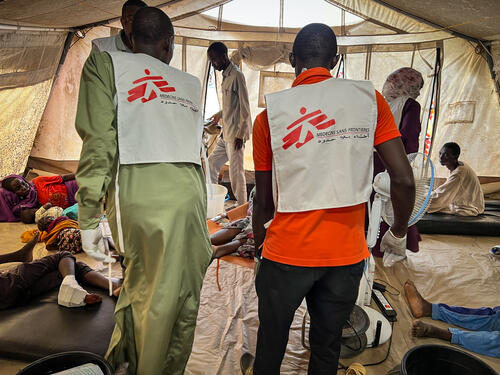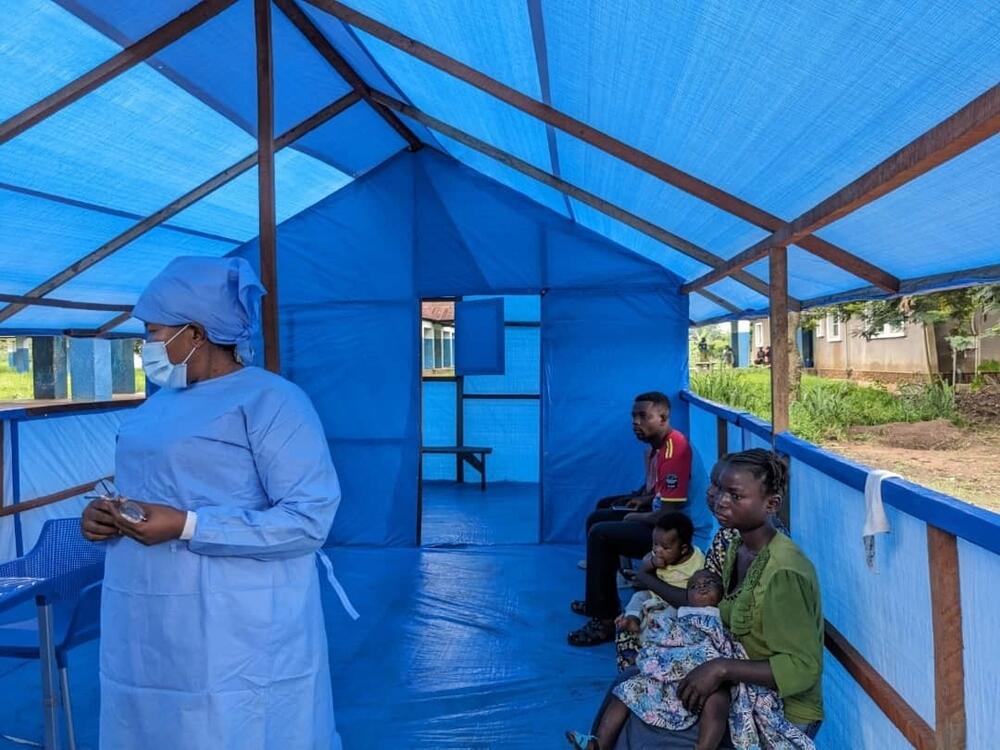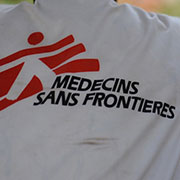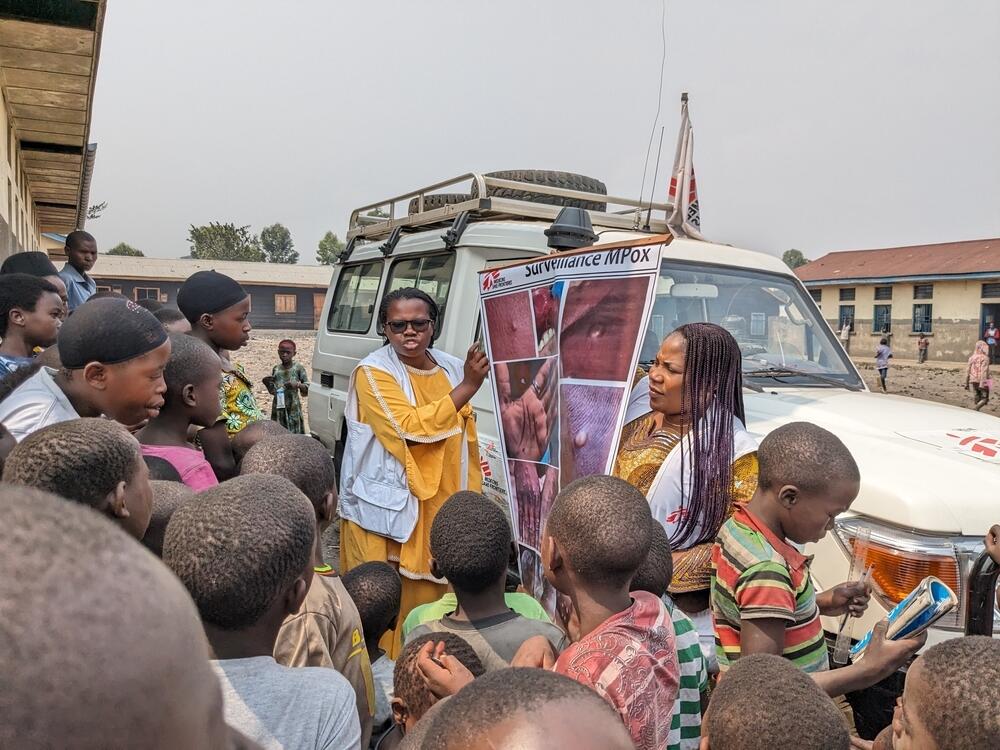Five things you need to know about the mpox outbreak in the DRC
In the Democratic Republic of Congo (DRC), the number of mpox (formerly known as monkeypox) cases have been on the rise for more than two years.
But in recent months, a mutation has led to human-to-human transmission of the virus and the number of people infected has surged. There are also suspected cases in camps for displaced people.
What is the mpox situation in the DRC and what are Médecins Sans Frontières / Doctors Without Borders (MSF) teams doing to respond to this new emergency? Medical coordinator Dr Louis Albert Massing provides some answers.
1 | What is mpox and how does it spread?
Mpox is a disease caused by the monkeypox virus. It is transmitted by close contact between people or with infected animals.
It has been endemic in Central Africa (strain I) and West Africa (strain II) since the 1970s and spread rapidly around the world in 2022-2023. Tens of thousands of cases linked to the West African variant have been reported in more than 110 countries.
In the DRC, where the mortality rate for the strain is much higher than in West Africa, more than 479 people have died since the start of this year.
By comparison, the World Health Organization (WHO) estimates that mpox claimed the lives of 89 people worldwide in 2022.
Mpox causes rashes, lesions, and pain, all of which require treatment to manage the symptoms effectively and avoid further complications. Most patients treated recover within a month, but the disease can be fatal if left untreated.
2 | What is the current mpox situation in the DRC?
Mpox is endemic in 11 of the DRC's 26 provinces. Endemic means a disease that exists permanently in a given area.
However, the number of cases in the country has been rising sharply for more than two years, leading health authorities to declare an epidemic in December 2022. The number of cases tripled in 2023, with more than 14,600 suspected cases notified and 654 deaths.
But in 2024, the situation has worsened further. Between January and the beginning of August, the disease had 14,000 suspected cases in 23 provinces. On 14 August the WHO declared the mpox outbreak a public health emergency of international concern.
The acceleration of the epidemic is worrying, especially as a genetic mutation has been identified in South Kivu province which has caused uninterrupted human-to-human transmission for months.
This had not yet been identified with the Congo Basin strain, unlike the West African strain that caused the global epidemic in 2022.
"MSF is calling for the mobilisation of all those involved in the response, and for the communities most at risk to be protected as quickly as possible by vaccination"
In addition to this mutation, another cause for concern is that the disease has been recorded in displaced people’s camps around Goma, in North Kivu, where the high population density is making the situation critical.
There is a real risk of an explosion of the disease, given the huge population movements in and out of the DRC.
The identification of cases, the monitoring of patients, and the care available remain extremely limited, while the lack of vaccines makes the situation even more difficult.
The perception of the disease as being linked to mysticism or witchcraft in some communities also complicates people’s adherence to public health measures. This illustrates the need to work closely with community leaders to get everyone to adhere to the measures.
MSF is calling for the mobilisation of all those involved in the response, and for the communities most at risk to be protected as quickly as possible by vaccination.
3 | What is the vaccines situation in the DRC?
The DRC has validated two vaccines and is trying to obtain supplies, but at this stage, no vaccine is yet available. Negotiations are underway with certain countries, and priority areas are being identified.
We hope that things will soon be resolved and that sufficient vaccines will be supplied to the country to act in the main epidemic areas.
4 | What are MSF teams doing in the DRC?
We have set up several interventions to support the response to this outbreak. This is not the first time: emergency interventions were already carried out in 2021 in Mai-Ndombe province, then in 2023 and early 2024 in Équateur province. But we’re stepping up our efforts given the recent developments.
In Uvira, a city in the South Kivu Provice, over the last five weeks our teams treated more than 420 patients, including 217 serious cases. We are also providing hospitals with kits for treatment and for taking samples.
Since mid-June, we have been providing care for people with severe symptoms at the Uvira general referral hospital and follow-up with patients with milder symptoms, while isolating suspected cases.
In North Kivu, we have launched surveillance and awareness-raising activities in the displaced people’s camp sites in Goma, and we are strengthening healthcare facilities in terms of triage, isolation and management of patients with mpox symptoms.
Two other interventions have been launched in northwest DRC. These are also aimed at training medical staff, strengthening epidemiological surveillance, and infection prevention and control measures. We will focus on awareness-raising particularly for groups of people that are sometimes more difficult to involve, such as disabled people.
5 | What should the immediate priorities be?
The response must be not only multifaceted but also adapted to each context because the epidemic is spreading in diverse areas.
Pending the arrival of vaccines, as many partners as possible must support other key aspects of the response such as laboratory analysis, surveillance, support for isolation and self-isolation, awareness-raising, etc. And, of course, patient care.
Today, all these aspects suffer from shortcomings and require enormous resources to function properly.
Along with many other organisations, we are calling for the vaccines to arrive in the country as quickly as possible and in large quantities, so that we can protect communities in the areas most affected. Particularly the most at-risk groups such as Congolese health workers, who are on the front line of the infection, as well as other at-risk groups such as sex workers and displaced people in camps.

Our work saves lives
MSF and the mpox outbreak
Mpox (previously known as monkeypox) is a viral disease usually found in West and Central Africa.
Since the beginning of 2024, there has been a surge in infections driven by a new variant of the virus. This is centred on the Democratic Republic of Congo (DRC) with cases also reported in neighbouring countries. On 14 August, the World Health Organization classified the mpox outbreak as a “public health emergency of international concern”.
Médecins Sans Frontières / Doctors Without Borders (MSF) teams are already present in the DRC, where we are treating patients and working to protect at-risk communities.


